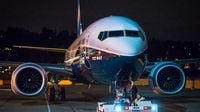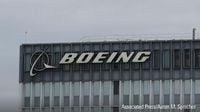Boeing shares took a significant hit on April 15, 2025, dropping 2.8% in premarket trading after China ordered its airlines to stop taking deliveries of the American aerospace giant’s jets. The stock fell to $154.86 as trade tensions between Washington and Beijing escalated, raising concerns for Boeing's future in one of its most critical markets.
According to a report from Bloomberg, Chinese carriers received instructions to halt any further acceptance of Boeing aircraft and to refrain from purchasing aviation equipment from U.S. suppliers. This announcement came in the wake of U.S. President Donald Trump imposing a staggering 145% tariff on Chinese imports, which has sparked a tit-for-tat trade war.
In retaliation, China announced its own tariffs of up to 125% on American goods, including aircraft and parts. This escalation has put Boeing in a precarious situation, as the company has already been grappling with various challenges, including production delays and quality control issues.
As the news broke, Boeing's stock continued to slide during early European trading, while its European rival Airbus saw a rise of 1.1%. Industry analysts noted that China’s latest move signals a willingness to leverage its purchasing power in the aerospace sector, which could have devastating implications for Boeing.
“It’s a major hit to Boeing, especially given their recent struggles,” said an unnamed industry analyst quoted in the report. The company has faced a series of setbacks, including the infamous 737 Max disasters and a recent door plug incident in January 2024 that renewed scrutiny over its aircraft safety standards.
Moreover, the ripple effects of the trade tensions are not limited to Boeing alone. Ryanair, the largest budget airline in Europe, has warned that it might delay upcoming deliveries of Boeing aircraft due to potential cost increases associated with the new tariffs. This could further complicate Boeing’s already challenging position in the market.
Aviation experts have expressed concerns that the tariffs could effectively double the cost of U.S.-made planes for Chinese buyers, putting Boeing at a significant disadvantage. In 2018, nearly a quarter of Boeing’s aircraft deliveries were made to China, a market that is projected to account for 20% of global aircraft demand over the next two decades.
As the situation continues to unfold, uncertainty looms for Boeing and other American aerospace companies that are eager to maintain a foothold in the Chinese market. The ongoing trade war not only threatens Boeing's profitability but also raises questions about the future of U.S.-China relations in the aerospace sector.
In light of these developments, experts are closely monitoring how both governments will respond in the coming weeks. The impact of these tariffs could have lasting effects on international trade dynamics, particularly in the aerospace industry.
As Boeing navigates this turbulent landscape, the company faces the challenge of regaining its footing amid increasing scrutiny and fierce competition from rivals like Airbus. With the stakes higher than ever, all eyes will be on Boeing as it seeks to adapt to the rapidly changing market conditions.
In conclusion, the latest trade tensions between the U.S. and China have introduced significant challenges for Boeing, raising concerns about its ability to thrive in a critical market. As the company grapples with these hurdles, the future of its operations in China remains uncertain, highlighting the broader implications of the ongoing trade war.







